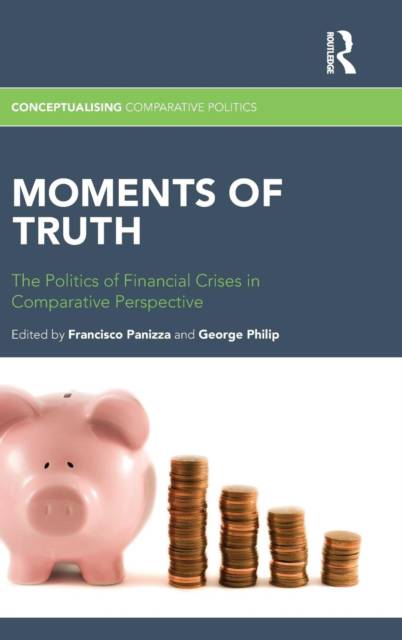
- Afhalen na 1 uur in een winkel met voorraad
- Gratis thuislevering in België vanaf € 30
- Ruim aanbod met 7 miljoen producten
- Afhalen na 1 uur in een winkel met voorraad
- Gratis thuislevering in België vanaf € 30
- Ruim aanbod met 7 miljoen producten
Moments of Truth
The Politics of Financial Crises in Comparative Perspective
Omschrijving
The current financial and sovereign debt crisis of the European Union and the United States can be regarded as the most recent of a wave of financial and sovereign debt crises that have affected different regions of the world over the past quarter century. While there is a large and growing body of literature on the economic aspects of financial crises, its political elements remain surprisingly under-studied.
Moments of Truth: The Politics of Financial Crises in Comparative Perspective fills this gap in the literature by looking at the political repercussions and policy implications of financial crises in comparative perspective, using case studies in Latin America, Korea, and Russia, as well as the contemporary crises in the US and in key European countries. Contributors to this volume look at the crises as critical junctures that generate high levels of uncertainty while calling for decisive action. The chapters emphasize structural or agency based explanations and give relevance to the role of ideas, interests, and institutions in explaining different outcomes. The questions addressed by the case studies include: how the crises were defined by key actors, the range of political and policy options available to deal with their impact, the role of ideas in policy shifts, how political and economic actors redefine their interests in contexts of uncertainty, how political institutions mediate reactions to the crises, what explains the choice of a certain option over other alternatives, and whether the crisis has (so far) resulted in significant political and policy changes or in incremental adjustments to the status quo.
The first book to comparatively analyze the political dimensions of financial crises across different global regions, Moments of Truth will be highly significant for any scholars interested in the contemporary debate on financial crises.
Specificaties
Betrokkenen
- Uitgeverij:
Inhoud
- Aantal bladzijden:
- 228
- Taal:
- Engels
- Reeks:
Eigenschappen
- Productcode (EAN):
- 9780415834117
- Verschijningsdatum:
- 7/08/2013
- Uitvoering:
- Hardcover
- Formaat:
- Genaaid
- Afmetingen:
- 152 mm x 229 mm
- Gewicht:
- 476 g

Alleen bij Standaard Boekhandel
Beoordelingen
We publiceren alleen reviews die voldoen aan de voorwaarden voor reviews. Bekijk onze voorwaarden voor reviews.










